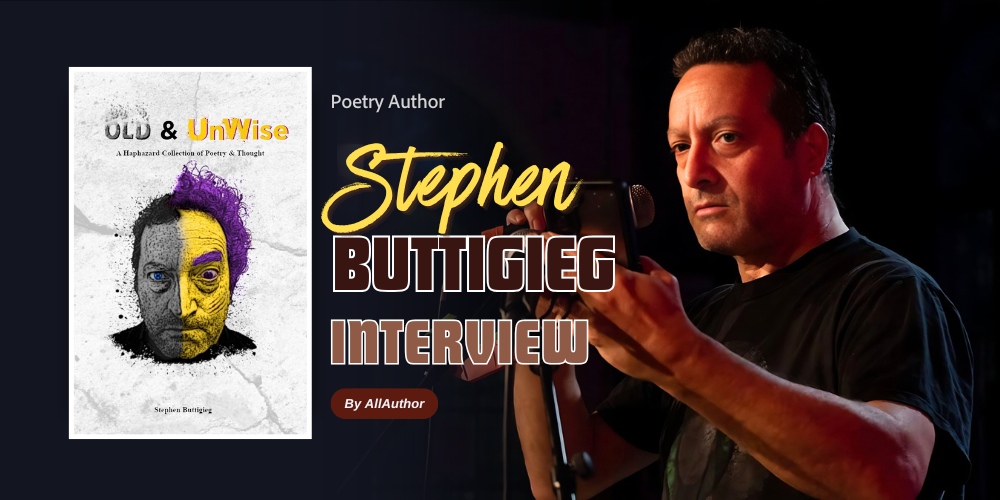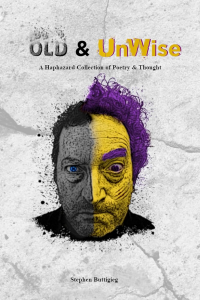Stephen Buttigieg Interview Published on: 24, Dec 2024
 Can you share a bit about your journey from the UK to Malta and then Belgium? How have these locations influenced your writing?
Can you share a bit about your journey from the UK to Malta and then Belgium? How have these locations influenced your writing?
I was born in the UK to Maltese parents. When I was ten my father got homesick and took the whole family back to Malta where I lived for over 30 years. I then moved to Belgium as a trailing spouse. Although I speak English and Maltese fluently, I still feel more comfortable expressing myself in English. This can be seen in my poetry where 95% of my poems are in English. There is a vein of sarcasm and humour in some of my poems which certainly bring out the influence that living in the UK and Belgium has had on me. Malta can best be seen in my poems when there are references to the sea or threatened environment and perhaps a little surprisingly my observation of storms. It doesn’t rain much in the Mediterranean but when it does the storms can be quite violent. My opinions on religion and politics have also been heavily influenced by my teen years in Malta although they haven’t stopped developing and living in three different countries has probably broadened my political outlook. Moreover, living in three different countries has taught me to see people for who they are, and not where they come from, their race or their religion.
You’ve coached basketball internationally. How has your experience in sports shaped your perspective as a poet?Coaching sports has taught me to appreciate that we shouldn’t judge others on their talent but on what they achieve with their talent. However, this only stands if everyone is given the same opportunity to improve themselves, something we rarely see in society.
In your poetry, you question humanity and highlight social issues. What specific issues are you most passionate about addressing in your work?I believe that everyone should have the same rights and opportunities in life. No one should be disadvantaged because of their sex, gender, race, class or creed. I also believe there should be equality among generations which is why I believe taking care of the environment and our planet’s resources is important. As for humanity, I cannot fathom that we live in a world where millions of people still live without adequate food, access to clean water and basic health care.
Your poetry features a mix of deep contemplation and whimsical topics like “If Ducks had Elbows.” How do you balance serious themes with humor in your writing?I believe that balance in life is important. I worry as much as the next person but also believe that we need to enjoy life. Humour is a greater healer. However, comedy can also be a powerful way of sending a message. I write to suit my mood, or to change it. If I only write when I am angry or sad then I am limiting myself.
“Old & UnWise – A Haphazard Collection of Poetry and Thought” was released in March 2024. What inspired you to compile this collection, and what themes do you hope readers take away from it?I have always wanted to publish a book. I have two unfinished novels and I am working on a collection of short stories but when I was younger poetry was always my favourite form of writing. I stopped in my early 20s but after a short (!) break of 30 years I returned to poetry and never turned back. The support I have found online, particularly Instagram, and at home really led me towards publishing a collection. There are many themes I tackle but I could sum them up in one sentence: “If, we spent more time being creative and trying to improve ourselves, instead of trying to be better than the next person, the world would be a better place”.
Can you describe your creative process? Do you have a specific routine or environment that helps you write?That is a great question. I do try to sit down to write for at least 30 minutes a day, but that is not always possible. It doesn’t mean that I am going to write in those 30 minutes but I try to empty my mind to see if I get any inspiration. I like to record any ideas/lines that I think of on my phone, so I often listen to these notes to see if I can get any further inspiration on the ideas/lines I would have jotted down. Sometimes I write for purpose, because I have a clear message I want to pass on. Other times I play around with a line, for example, the lemons in my apple tree and a poem is born around that. I may not know where it is going during the initial phase but usually a message is intertwined along the way. I don’t keep to one style. I have written a few sonnets, experimented with Haiku, used different rhyming schemes and very often write in free verse. On occasion it is the poem itself which encourages me to take on a certain form.
As someone who questions humanity through poetry, how do you think poetry can inspire change or awareness about social issues?I think art of any form, be it dance, theatre, film, music, song or written word, or a combination of these, is able to challenge concepts and express opinions in a way that can elicit emotions and encourage dialogue. Poetry, whether spoken or read, is ideal due to the relative brevity of the form, especially in today’s world where time seems to be of a premium and social media has constricted the attention span of people in general, poetry is a great way to instigate critical analysis of what goes on around us every day.
What are some of the most significant challenges you've faced in your writing journey, and how have you overcome them?Time is always a constraint. There was a period in my life where I was getting by on 4 hours sleep a day. I was teaching, coaching, a parent, a husband and running my own basketball school. I don’t recommend it to anyone. During that period the only writing I did was a weekly basketball column in the The Times Of Malta, which was often written between bites of a sandwich during lunch break. When I moved to Belgium, as a trailing spouse I had more time on my hands but had got so used to not writing that it was something that I just didn’t do. One of the events that inspired me to write again was the brutal murder of the journalist Daphne Caruana Galizia in Malta. I realised the importance of getting out messages while I could, and I slowly returned to poetry writing.
You mentioned planning a sequel to your poetry collection. What themes or ideas do you hope to explore in this upcoming work?I would say that the general themes would be the same, but the voice may be a little different, as may the emphasis. I am still the same person with the same messages to give but the way I deliver them will have developed. Perhaps more weight will be given to mental health issues, but there still will be an element of humour and fantasy sprinkled through the book.
Can you tell us about a particular poem in your collection that holds special meaning for you? What inspired it?The Last Bus Home was written to a prompt. It is a dedication to another poet who I met online. A very talented writer who was homeless and going through difficult times. I have since lost contact with him. The poem itself is about a person whose only connection to life were the drawings he made while seated at a bus stop. I chose this poem because I hope that my friend will come across this interview and maybe reach out to me.
How has your international background influenced the subjects you write about and the style of your poetry?More than anything I think it gives me a broader outlook on life. I understand how events in distant places can influence what is going on in my immediate vicinity and vice-versa. I look at the good and the bad in world news and will write about the issues if they inspire me.
What role do you believe poetry plays in the broader literary landscape, especially in addressing contemporary issues?I think poetry is becoming more relevant than ever. There was a time when poetry was considered a high-brow form of expression for the select few. I see more and more young poets come through with powerful pieces, often performed during protests or public demonstrations. The spectrum that poetry can reach is broadening.
Are there any poets or literary figures who have significantly influenced your work? If so, how?I was an avid reader when I was young but strangely enough I did not read a lot of poetry. Probably the greatest influence on my writing is one of my favourite authors, Douglas Adams. In fact, the quote at the beginning of my book comes from Mostly Harmless one of The Hitchhiker’s Guide to the Galaxy “Trilogy”. His influence shows up in my humorous pieces, although there are a few lines in one or two of my more serious poems I would like to think he would have also approved of.
Looking ahead, what are your aspirations as a poet? Are there specific projects or collaborations you’re excited about?I hope to continue to develop as a writer/poet. Whenever I can I attend workshops even if they are intended for beginners, there is always something to learn. Poetry will remain my main focus although I am working on several short stories which I may publish as a collection or submit to journals. I hope to continue to experiment with different ways of delivery of my poems (written/spoken/video) I have a couple of collaborations in the pipeline, one is a musical/poetry collaboration with my nephew who produces his own music and I also hope to engage the help of my daughter in producing reels (her video/editing skills are much better than mine!). Beyond the family I am looking to turn one of my longer poems into an animation (any volunteers) and I am also considering a poetry/painting collaboration. How I am going to manage all of that is another matter.
What is your takeaway based on your experiences with AllAuthor? What is it about this site that you like and dislike?I have found the tools on AllAuthor to be very useful in promoting my book. They are very easy to use. Since joining AllAuthor I have seen an upturn in sales. It has also been a great way to discover new authors and hopefully more and more readers will catch on to this and visit the site.
Share Stephen Buttigieg's interview
Born in the UK, Stephen Buttigieg moved to the island of Malta at the age of ten and now resides in Belgium. Though he wrote poetry prolifically until age 21, a traumatic experience involving the loss of one of his poems led him to stop. Over three decades later, the isolation of lockdown reignited his passion for writing. The outpouring of encouragement from the online community inspired him to devote every free moment to his craft, channeling life’s reflections into verse.


